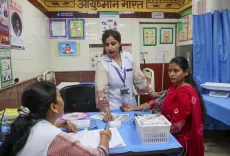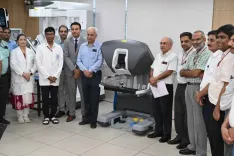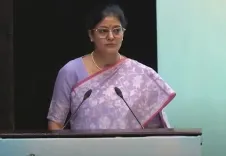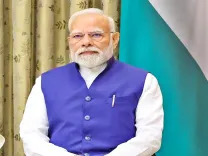Can a State Palliative Care Policy Improve Healthcare and Lower Costs for Patients in Delhi?

Synopsis
Key Takeaways
- Establishment of a state Palliative Care Policy is vital for enhancing healthcare in Delhi.
- Home-based palliative care is in high demand, with thousands of individuals affected.
- Chronic illnesses impose serious financial hardships on families.
- Government engagement is essential for effective palliative care delivery.
- Collaboration among public health, civil society, and medical institutions is key.
New Delhi, Sep 12 (NationPress) The establishment of a state Palliative Care Policy is essential for enhancing healthcare services and decreasing expenses for patients in Delhi, as stated by health experts on Friday.
Palliative care focuses on alleviating the physical, social, and spiritual distress of patients battling chronic life-limiting conditions and their caregivers.
Parth Sharma from the Department of Community Medicine at Maulana Azad Medical College in New Delhi emphasized to IANS, "A dedicated palliative care policy in Delhi could consolidate resources, unify disjointed health systems, and secure consistent funding."
Sharma urged Delhi’s policymakers to contemplate the formulation of a regional policy, which would mark Delhi as the pioneering region in North India to adopt its own palliative care framework. This initiative could establish a care model for urban settings, potentially replicable worldwide.
A recent investigation, spearheaded by Sharma alongside fellow researchers from the university, revealed a pressing need for home-based palliative care within urban settings, alongside the financial burdens that families encounter.
The research team assessed 43,267 individuals residing in Delhi’s urban resettlement colonies to evaluate the demand for home-based palliative care and the repercussions of chronic illnesses on families.
Findings indicated that 2 per 1000 individuals required home-based palliative care.
Most affected were elderly men (60%), with 51.11% being illiterate and 55.56% having been unemployed. Neurological disorders, particularly strokes (67.8%), emerged as the predominant cause of disability.
Nearly 49% of participants exhibited severe dependence, while 62.22% of families reported diminished quality of life, and 34.44% incurred debts due to illness.
Approximately 74% possessed ration cards, 50% received pensions, and merely 15.56% had public health insurance.
The average out-of-pocket healthcare cost comprised 58.56% of their per capita income and 11.11% of total family income, as detailed in the journal Palliative Care and Social Practice.
Furthermore, the study indicated that the social implications extended beyond financial concerns: with 42% acknowledging a decline in diet, 42% halting celebrations of festivals and family gatherings, 31% reporting job disruptions for their caregivers, and 14% facing educational interruptions. One family even noted a suicide attempt.
"With an estimated 60,000 to 80,000 individuals requiring home care in Delhi, collaboration among public health centers, medical institutions, civil society, and the government is crucial. Currently, care is solely provided by civil society; governmental involvement can address substantial gaps," the expert conveyed to IANS.
KV Hamza, General Secretary of DNipCare (Delhiites' National Initiative in Palliative Care), remarked, "As palliative care is a fundamental human right, equitable care can be assured solely through governmental mechanisms with a clearly defined Palliative Care Policy in effect."
Hamza, a former official at the Ministry of Finance, highlighted that while NGOs and the private sector can contribute significantly, reaching the most underserved patients in the vast metropolis can only be achieved through governmental directives.
Sharma also proposed broadening home-based palliative care through the National Programme for Palliative Care and involving medical colleges in community-level palliative care initiatives. Additionally, extending government insurance for outpatient medications could prove beneficial.









